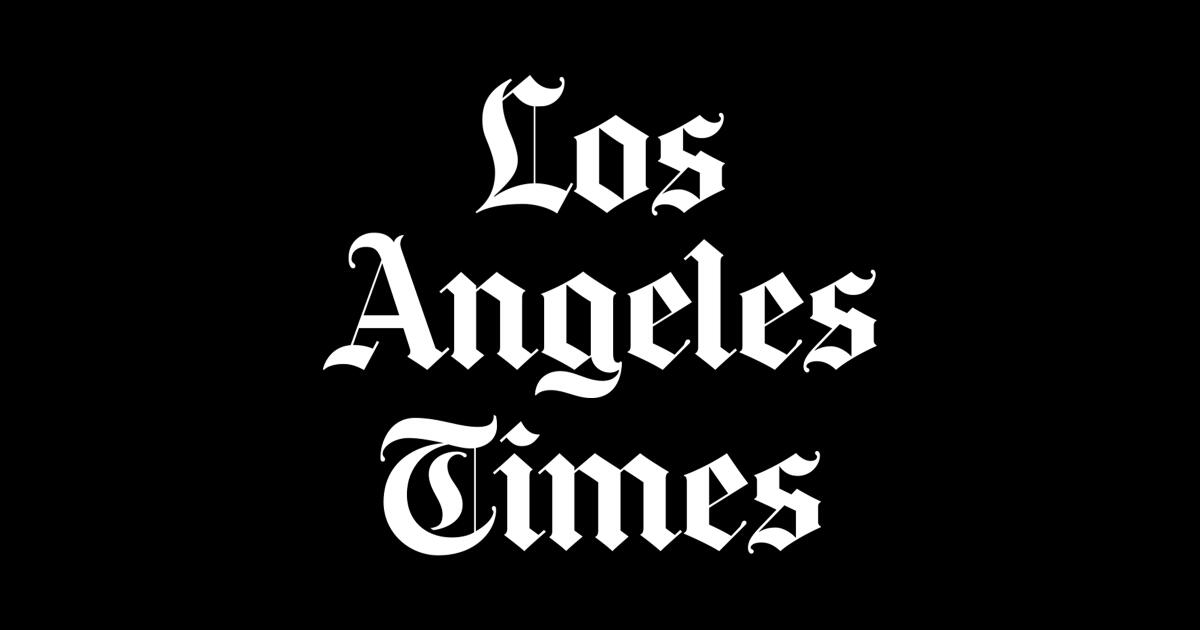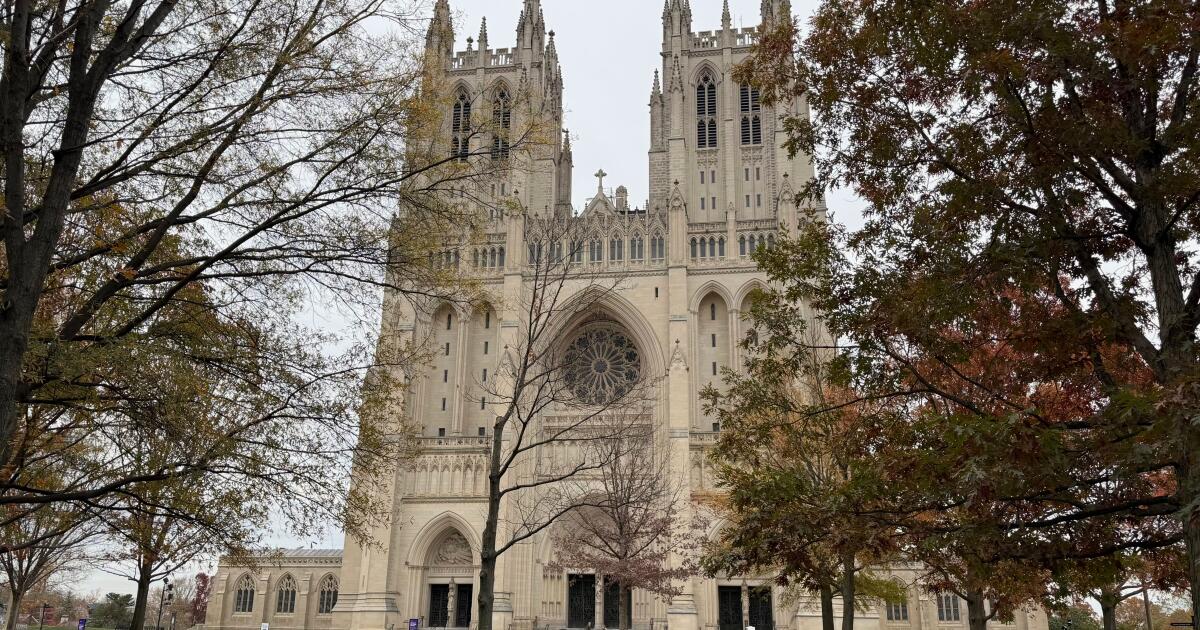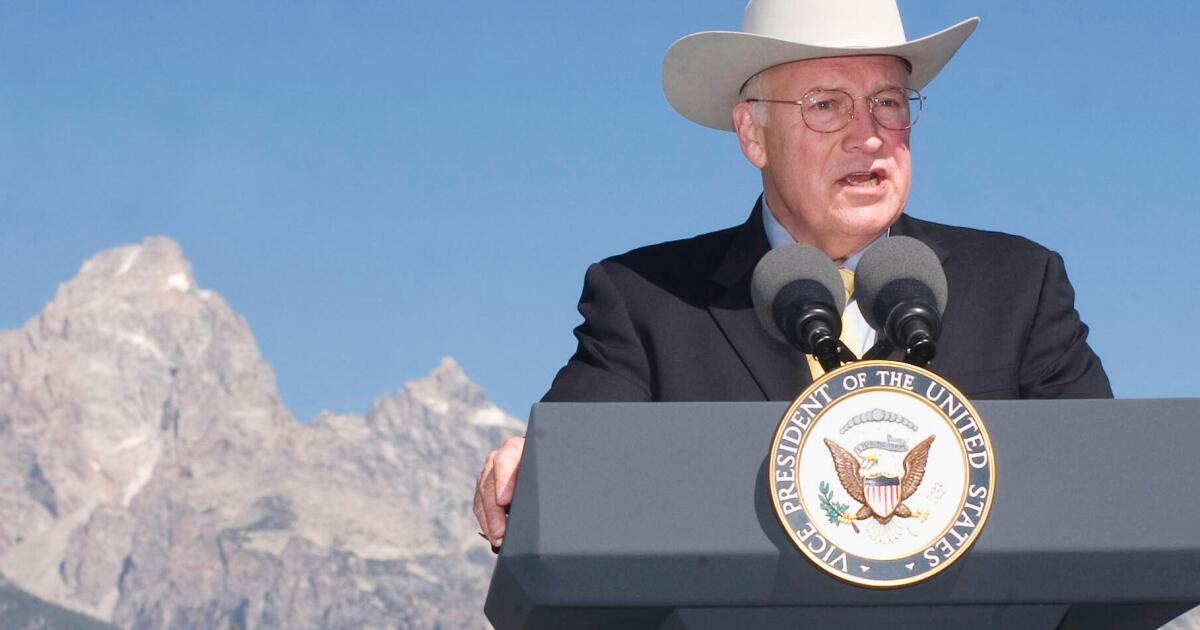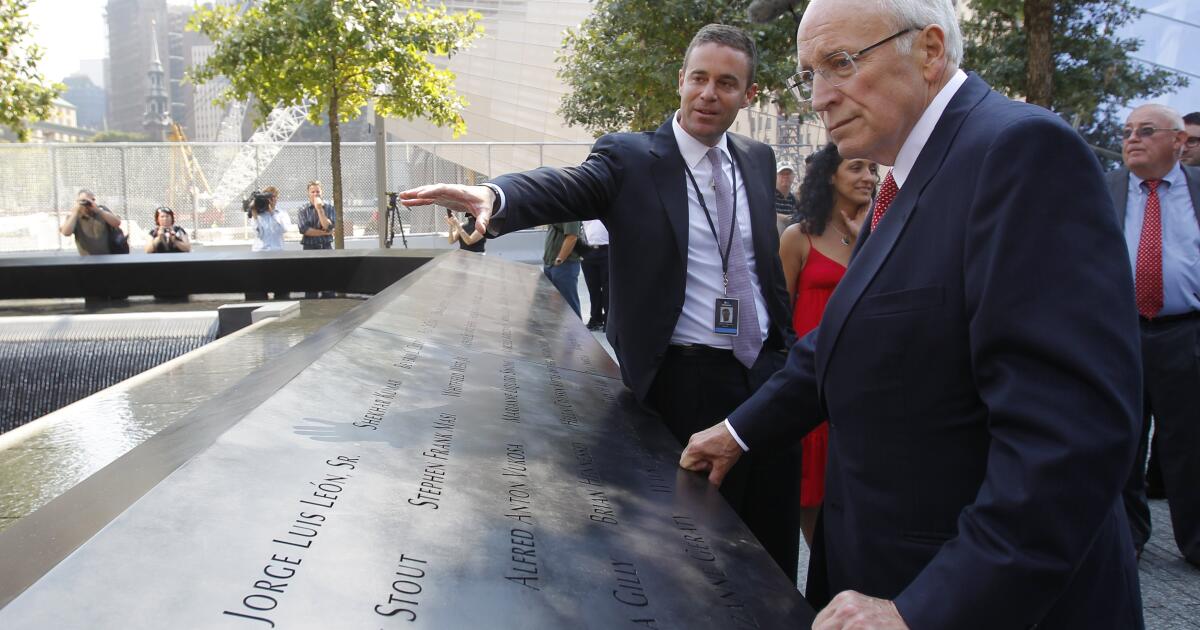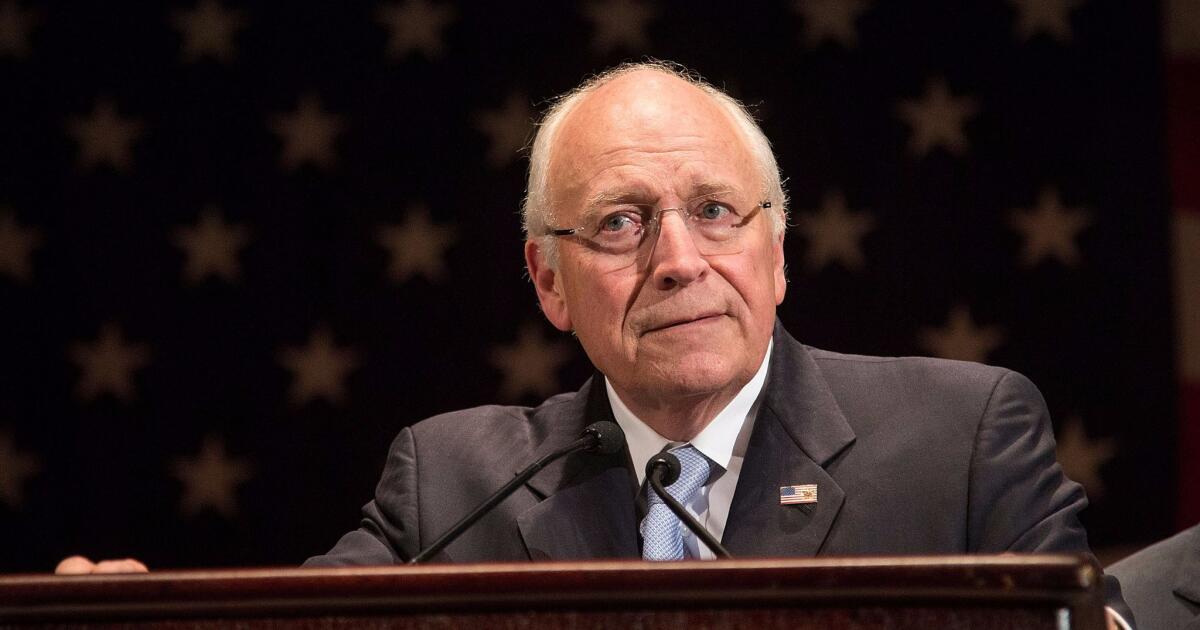Richard B. Cheney, the former vice president of the United States who was the architect of the nation’s longest war as he plotted President George W. Bush’s thunderous global response to the 9/11 terror attacks, has died.
Vexed by heart trouble for much of his adult life, Cheney died Monday night due to complications of pneumonia and cardiac and vascular disease, according to a statement from his family. He was 84.
“For decades, Dick Cheney served our nation, including as White House Chief of Staff, Wyoming’s Congressman, Secretary of Defense, and Vice President of the United States,” the statement said. “Dick Cheney was a great and good man who taught his children and grandchildren to love our country, and to live lives of courage, honor, love, kindness, and fly fishing. We are grateful beyond measure for all Dick Cheney did for our country. And we are blessed beyond measure to have loved and been loved by this noble giant of a man.”
To supporters and detractors alike, Cheney was widely viewed as the engine that drove the Bush White House. His two-term tenure capped a lifetime of public service, both in Congress and on behalf of four Republican presidents.
It often fell to Cheney, not President Bush, to make an assertive, unapologetic case for the American-led wars in Afghanistan and Iraq and for the controversial antiterrorism measures such as the Guantánamo Bay prison. And after the election of President Obama, it was once again Cheney, not Bush, who stood among the new president’s fiercest critics on national security.
In an October 2009 speech — one emblematic of the role he embraced after leaving the White House — Cheney blasted the Obama administration for opening a probe of “enhanced” interrogations of suspected terrorists conducted during the Bush years.
“We cannot protect this country by putting politics over security, and turning the guns on our own guys,” he said. The rhetoric was textbook Cheney: blunt, unvarnished, delivered with authority.
While Cheney at the time was attempting to occupy the leadership vacuum in the GOP in the age of Obama, there was little doubt that he also was motivated to preserve a legacy that appears to be as much his as former President Bush‘s. For eight years, Cheney redrew the lines that defined the vice presidency in a way no predecessor had. His office enjoyed greater autonomy than others before it, while working to keep much of his influence from plain sight. That way of operating led to a challenge before the Supreme Court as well as a criminal investigation over a leak of classified information.
Moreover, the image of a powerful backroom operator managing the Bush administration’s “war on terror,” combined with his service as Defense secretary during the Persian Gulf War and his stint as a chairman of defense contracting giant Halliburton, made Cheney a towering bête noire to liberals worldwide. To them, he embodied a dangerous fusion of politics and the military-industrial complex — and they viewed his every move with deep suspicion.
To his champions, however, he was the firm-jawed, hulking, resolute defender of American interests.
Standing with the administration was more than a duty to Cheney; it was an article of faith. The invasion of Iraq “was the right thing to do, and if we had to do it over again, we’d do exactly the same thing,” Cheney said in a 2006 interview, even as the nation slowly learned that U.S. intelligence suggesting Saddam Hussein’s regime possessed weapons of mass destruction was simply not true.
Three years earlier, Cheney had pledged that the U.S. would be greeted in Iraq as “liberators” — a comment that haunted him as insurgents in the country gained strength, killed thousands of allied troops and extended the conflict for years. The war in Afghanistan would drag on for 20 years, ending in 2021 as it had begun, with the Taliban back in control.
While Cheney will largely be remembered for his leading role in the response to the 9/11 terror attacks, he had long worked the corridors of power in Washington. He was a White House aide to President Nixon and later chief of staff to President Ford. As a member of the House from Wyoming, he rose quickly to become part of the Republican leadership during the 1980s. In the early ’90s, he ran the Pentagon during the Gulf War.
Richard Bruce “Dick” Cheney was born in Lincoln, Neb., on Jan. 30, 1941, and spent much of his teenage years in Casper, Wyo. His father worked for the U.S. Soil Conservation Service.
As a young man, he was more interested in hunting, fishing and sports than in academics, and a stint at Yale University was short-lived. He eventually obtained bachelor’s and master’s degrees from the University of Wyoming and studied toward a doctorate at the University of Wisconsin.
In 1964, he married Lynne Ann Vincent, who became a lifelong political partner while strongly influencing Cheney’s conservatism. Daughter Elizabeth, who was elected to Congress in 2017, was born in 1966 and her sister, Mary, arrived three years later. The sisters became embittered years later when Elizabeth — who preferred Liz — took a stance opposing same-sex marriage, which seemed a slap to Mary and her wife. Cheney, however, offered his support for such unions, an early GOP voice for same-sex marriage. Years later, he came to Liz’s defense when she broke with fellow Republicans and voted to impeach President Trump following the Jan. 6, 2021 attack on the U.S. Capitol. In addition to his wife and daughters, Cheney is survived by seven grandchildren.
A fellowship sent Cheney to Washington, where he soon began working for a politically shrewd House member who also was a lifetime influence, Donald H. Rumsfeld. When Rumsfeld joined the Nixon administration, Cheney followed.
After Ford succeeded Nixon in the wake of Watergate, Rumsfeld served as chief of staff, with Cheney at his side. Ford eventually appointed Rumsfeld secretary of Defense, and Cheney, at 34, ran the White House. Even then, his calm reserve was a hallmark.
Although nearly everyone working for him was older, “He was very self-assured,” James Cannon, a member of Ford’s White House team, said years later. “It didn’t faze him a bit to be chief of staff.”
Ford lost a narrow election to Jimmy Carter in 1976, but Cheney’s Washington career was just getting underway. He headed back to Casper and in little more than a year was running for Congress.
His health, though, already was a factor. In 1978, at age 37 and in the midst of a primary election campaign, he had a heart attack, the first of several. He would undergo multiple surgeries, including a quadruple bypass, two angioplasties, installation of a heart pump and — in 2012 — a transplant. His frequent trips to the hospital and seeming indestructibility provided fodder for late-night talk show hosts during Cheney’s vice presidency.
With the help of television ads reminding voters that Dwight D. Eisenhower and Lyndon B. Johnson had served full White House terms despite having had heart attacks, he narrowly won the Republican nomination and, in November 1978, secured election to the House of Representatives from Wyoming’s single district.
In Congress, he was known as a listener more interested in problem-solving than conservative demagoguery, even as he quietly built a voting record that left no doubt about where he stood on the political spectrum. He quickly moved into the ranks of GOP leadership.
Cheney stepped into the public spotlight after he was named Defense secretary by President George H.W. Bush in 1989. As the Berlin Wall fell and the Cold War cooled, Cheney was charged with overseeing a Pentagon that was more fractious than usual. In a test of political and managerial will, he oversaw major reductions in the Defense budget, a profound downsizing of forces and the closing of obsolete military bases. He helped implement the U.S. invasion of Panama in 1989 to oust the country’s leader, Manuel Noriega, for drug trafficking and racketeering.
But Cheney — along with his hand-picked chairman of the Joint Chiefs of Staff, Colin Powell — made his mark in the American response to the Iraqi invasion of Kuwait in 1990. Cheney played a key role in persuading the Saudi royal family to allow American troops to be stationed in Saudi Arabia to defend against a looming attack from Hussein’s forces.
The Cheney-led Pentagon then shifted to offense in 1991, amassing an enormous American force that totaled more than 500,000 soldiers, nearly twice the number employed in the 2003 U.S. invasion of Iraq. The U.S. military, with help from allied countries, overwhelmed the Iraqi forces in Kuwait in only 43 days and easily entered Iraq.
Characteristically, Cheney would defend the then-controversial decision to halt the U.S. advance toward Baghdad, which left Hussein in power. “I would guess if we had gone in there, we would still have forces in Baghdad today. We’d be running the country,” he said in a 1992 speech. “We would not have been able to get everybody out and bring everybody home.”
Cheney’s efforts to station U.S. troops in Saudi Arabia, considered critical to the push to repel Iraq, would have unforeseen ramifications. The military presence there helped radicalize young Islamic militants such as Osama bin Laden.
After President Clinton’s victory in 1992, Cheney left government service. Three years later, he assumed the helm of Halliburton, one of the world’s leading oil field companies and a prominent military contractor. The company thrived under Cheney’s leadership: Its relationship with the Pentagon flourished, its international operations expanded and Cheney grew wealthy.
In 2000, then-Texas Gov. George W. Bush, the Republican nominee for president, asked Cheney to head up the search for his running mate, then ultimately chose Cheney for the job instead. He brought to the ticket an element of maturity and Washington gravitas that the inexperienced Bush did not possess.
Cheney’s lack of design on the presidency, and his willingness to return to government 10 days shy of his 60th birthday, seemingly gave Bush the benefit of his experience and earned Cheney a measure of trust — and thus authority — commanded by few presidential advisors.
Once in office, Cheney, mindful of lessons learned in the Ford White House, sought to revitalize an executive office he believed had become too hemmed in by Congress and the courts. He termed it a “restoration.”
“After Watergate, President Ford said there was an imperiled president, not an imperial presidency,” said presidential historian Robert Dallek. Cheney, he said, felt “he badly needed to expand the powers of the presidency to assure the national security.”
In office barely a week, Cheney created a national energy policy task force in response to rising gasoline prices. A series of meetings with top officials from the oil, natural gas, electricity and nuclear industries were closed to the public, and Cheney refused to reveal the names of the participants. Cheney would exert similar influence over environmental policy and, with an office on Capitol Hill, forcefully advance the president’s legislative agenda.
A lawsuit seeking information about the task force made its way to the Supreme Court, which ruled in the vice president’s favor in 2004. One of the justices in the majority was Antonin Scalia, who was a friend and, it was later revealed, had recently gone duck hunting with the vice president.
Another hunting trip gone awry earned Cheney embarrassing headlines in 2006 when he accidentally shot and wounded a member of the party with a round of birdshot while quail hunting on a Texas ranch.
More troubling to Cheney was a federal criminal probe in connection with the 2003 leak of the identity of covert CIA operative Valerie Plame Wilson. The investigation resulted in the conviction four years later of Cheney aide I. Lewis “Scooter” Libby for perjury and obstruction of justice. Libby was later pardoned by President Trump.
Cheney, however, will be largely remembered for his unwavering belief that the U.S. invasions of Afghanistan and Iraq — especially the latter — were essential, a stance he maintained even as the missions in both theaters evolved from rooting out suspected terrorists to nation-building, and even as the casualties skyrocketed and it became clear the 20-year mission was doomed.
When U.S. troops and civilians were pulled out of Afghanistan in a fraught and fatal departure in 2021, it was Cheney’s daughter who spoke up.
“We’ve now created a situation where as we get to the 20th anniversary of 9/11, we are surrendering Afghanistan to the very terrorist organization that housed al Qaeda when they plotted and planned the attacks against us,” Rep. Liz Cheney (R.-Wyo.) said.
The former vice president’s steely resolve was captured years later in “Vice,” a 2018 biographical drama in which Christian Bale portrayed Cheney as a brainy yet uncompromisingly uncharismatic leader.
It was Cheney who insisted early on that Hussein possessed weapons of mass destruction. “There is no doubt he is amassing them to use against our friends, against our allies, and against us,” Cheney said in August 2002. The U.S. eventually determined that Iraq had no such weapons.
He argued forcefully that Hussein was linked to the 2001 terror attacks. When other administration officials fell silent, Cheney continued to make the connections even though no shred of proof was ever found. In a 2005 speech, he called the Democrats who accused the administration of manipulating intelligence to justify the war “opportunists” who peddled “cynical and pernicious falsehoods” to gain political advantage.
Cheney also frequently defended the use of so-called extreme interrogation methods, such as waterboarding, on al Qaeda operatives. He did so in the final months of the Bush administration, as both the president’s and Cheney’s public approval ratings plunged.
“It’s a good thing we had them in custody and it’s a good thing we found out what they knew,” he said in a 2008 speech to a friendly crowd at the Conservative Political Action Conference.
“I’ve been proud to stand by him, the decisions he made,” Cheney said of Bush. “And would I support those same decisions today? You’re damn right I would.”
Oliphant and Gerstenzang are former Times staff writers.
Staff writer Steve Marble contributed to this story.
